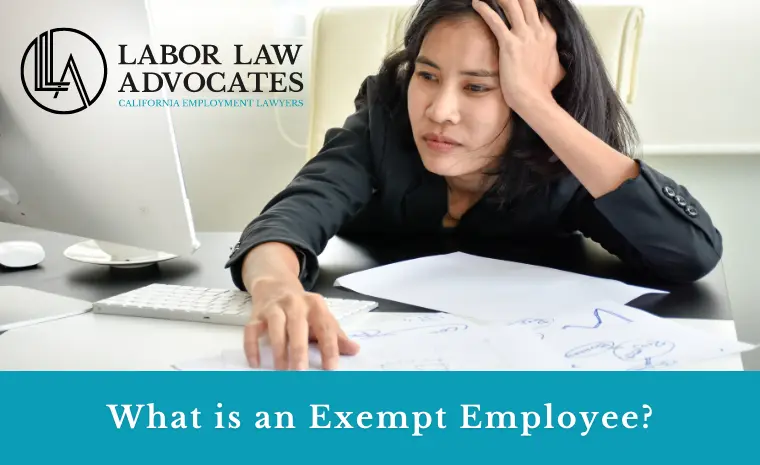What is an Exempt Employee?
California’s labor laws aim to protect employees and ensure fair working conditions. To achieve this, the laws distinguish between exempt and non-exempt employees. Exempt workers are generally excluded from certain labor protections, such as overtime wages, meal and rest breaks, and other wage and hour regulations. California labor law decides whether a worker is considered exempt; not the employer.
Understanding whether you are classified as exempt or non-exempt is crucial to ensure your rights are respected and that you receive the appropriate compensation and benefits.
Has your employer misclassified you?
Understanding Exempt Employees
Exempt employees are individuals who meet specific criteria established by California labor laws and are exempt from certain wage and hour regulations. The term “exempt” refers to being excluded from the rules that govern non-exempt employees. While non-exempt employees are entitled to overtime hours pay and other benefits, exempt employees are not.
To be classified as an exempt employee in California, you must satisfy specific criteria related to job duties, salary, and authority. These criteria are outlined in the Industrial Welfare Commission (IWC) Wage Orders and the California Labor Code. The primary purpose of these criteria is to determine whether an employee performs executive, administrative, professional, or computer-professional duties.
Common Exempt Employee Categories
In the modern workplace, there are various categories of employees, each with its own rights, responsibilities, and benefits. One important distinction is between exempt and non-exempt employees. While non-exempt employees are entitled to overtime pay and other protections under the FLSA regulations (Fair Labor Standard Act), exempt employees are not subject to these requirements. Instead, exempt employees enjoy certain privileges and are exempted from certain provisions of labor laws.
Some of the common exempt employee categories include:
Executive Exemption
Executive-exempt employees are those who hold high-level management positions within a company. They are responsible for directing the work of other employees, have the authority to make important decisions, and are involved in the formulation of company policies and strategies. Examples of executive exempt employees include CEOs, CFOs, and department heads.
Administrative Exemption
Administrative exempt employees are individuals who perform non-manual work directly related to the management or general business operations of the company. They exercise independent judgment and discretion in their job roles and typically have the authority to make important decisions. Examples of administrative-exempt employees include HR managers, financial analysts, and office managers.
Professional Exemption
Professional exempt employees are those who have specialized knowledge and skills in a particular field. They typically require advanced education or training and perform work that is predominantly intellectual or creative in nature. Examples of professional exempt employees include doctors, lawyers, engineers, and architects.

Computer Professional Exemption
Computer exempt employees are individuals who work in the field of computer systems analysis, programming, or software engineering. They must primarily perform duties that require the application of systems analysis techniques and procedures, design, development, documentation, analysis, creation, testing, or modification of computer systems or programs. Examples of computer exempt employees include software developers, IT consultants, and database administrators.
Outside Sales Exemption
Outside sales exempt employees are individuals whose primary job duty is making sales or obtaining orders for products or services while regularly working away from the employer’s place of business. They typically have the freedom to set their own schedules and are compensated through commissions or similar payment structures.
Highly Compensated Exemption
Highly compensated exempt employees are those who earn a total annual compensation above a certain threshold set by the Department of Labor. They must also perform at least one of the duties of an exempt executive, administrative, or professional employee. This category allows employers to exempt certain employees from overtime pay requirements based on their high level of compensation.
Certain Industry-Specific Exempt Employees
Certain industries have specific exemptions for certain job roles. For example, the movie industry has exemptions for creative professionals such as actors, writers, and directors. The agricultural industry has exemptions for certain farmworkers. It is important for employers to be aware of these industry-specific exemptions and ensure compliance with applicable labor laws.
Has your employer misclassified you and withheld your benefits?
Rights and Benefits of Exempt Employees
While exempt employees are not entitled to certain protections granted to non-exempt employees, they often enjoy higher salaries and greater flexibility in their work schedules. Exempt employees typically have more control over their time and decision-making processes, allowing them to assume greater responsibilities within their organizations.
Apart from meeting specific job duty requirements, exempt employees must also receive a salary that meets or exceeds the minimum salary threshold set by California labor laws. The salary threshold may vary depending on the size of the employer and the specific exemption category. It is essential for both employers and employees to understand these salary requirements to ensure compliance with the law.
Consequences of Misclassification
Misclassification of employees, intentionally or unintentionally, can occur in the workplace. Misclassifying an employee as exempt when they should be non-exempt can lead to legal issues and financial consequences for employers. Similarly, misclassified employees may not receive the proper compensation and benefits they are entitled to under the law.
Misclassification can result in legal disputes, employee grievances, and potential lawsuits. Employers found guilty of misclassifying employees may face penalties, including back wages, fines, and potential class-action lawsuits. On the other hand, misclassified employees can seek legal recourse to recover unpaid wages and other damages resulting from the misclassification.
What is an Exempt Employee? Frequently Asked Questions
How can I determine if I am an exempt employee in California?
To determine your employment classification, you need to assess your job duties, salary, and authority within the organization. Consulting an employment attorney or seeking guidance from the California Labor Commissioner’s Office can provide further clarification.
What happens if my employer misclassifies me as an exempt employee when I should be non-exempt?
If you believe you have been misclassified, you may have grounds to seek legal recourse to recover unpaid wages and other damages resulting from the misclassification. It is advisable to consult with an employment attorney to understand your rights and explore your options.
What are the consequences for employers who misclassify employees?
Employers found guilty of misclassifying employees may face penalties, including payment of back wages, fines, and potential class-action lawsuits. It is crucial for employers to correctly classify employees to avoid legal issues and maintain compliance with labor laws.
Let Us Fight Against Misclassification!
Are you unsure about your employment status? Have you been misclassified as an exempt employee when you should be receiving overtime pay and other benefits? Don’t let your rights be violated any longer!
Our experienced labor law attorneys specialize in helping employees like you who have been misclassified to get justice and ensure their rights. Labor Law Advocates understand the importance of fair treatment in the workplace, and it’s dedicated to fighting for their clients. We have extensive knowledge about California labor laws, and we will use everything in the jurisdiction to obtain the justice you deserve.
Call our labor law attorneys now. We are available to assist you 24/7.




